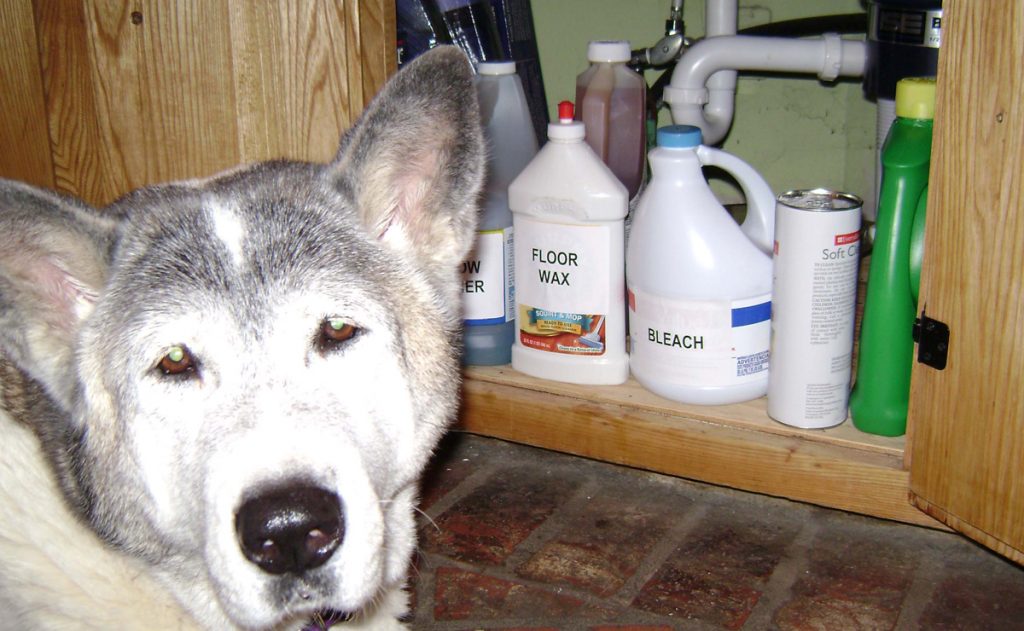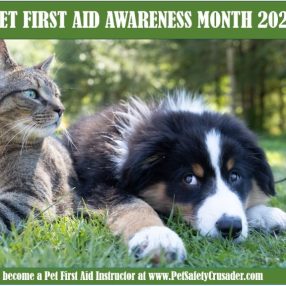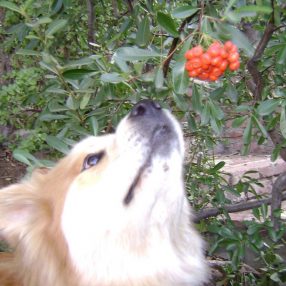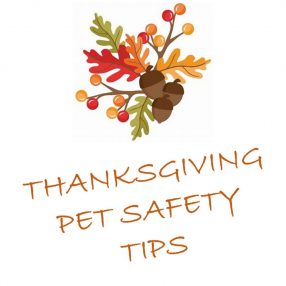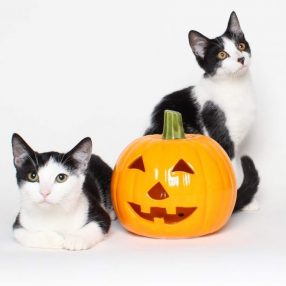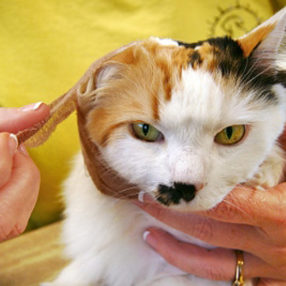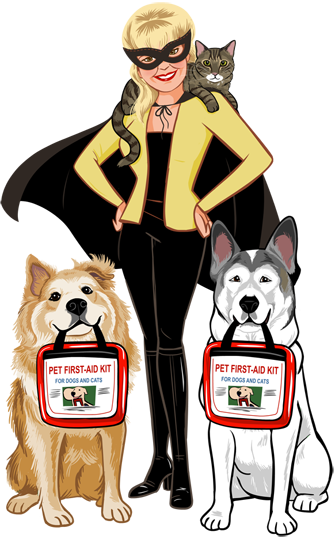COMMON POISONS AND WHAT TO DO TO SAVE YOUR PET
Dogs love to chew. However, that spray bottle, can or other container under your cabinet which may be viewed as a toy by your curious pooch, will definitely ruin the day if his canines puncture it and he ingests the liquid inside. Your cat may love to spend time pouncing in the greenery, but did you know that Lilies are particularly dangerous and can be fatal to our feline friends if consumed? Accidents happen any time of the year, but with Valentine’s Day and Easter comes an abundance of chocolate, flowers and perfume, all of which can poison you pet. Knowing what to do and having the necessary tools on hand can avert a minor injury or a major disaster.
Size does matter when it comes to poisoning. What could kill a Chihuahua may have no affect on a Saint Bernard since the detrimental power a toxin has is proportional to the animal’s body weight. Chocolate is poisonous to dogs, cats and ferrets! Although antioxidants in dark chocolate are considered good for human hearts, the darker the chocolate…the worse it is for your pet. The culprit is theobromine — both a cardiac stimulant and a diuretic, which can speed up the heart while pulling fluids from the body resulting in vomiting, diarrhea, rapid heart rate, seizures and death. Every year, thousands of pets needlessly suffer and many die from ingesting substances in our homes and even from human food (just because it’s good for us does not make it safe for our dogs and cats). Learn what to do before its too late, and don’t foolishly think it won’t happen to you.
COMMON SYMPTOMS ASSOCIATED WITH POISONING
- Depending on the substance, your pet may experience any of these signs:
- Muscle tremors or seizures
- Vomiting and/or diarrhea, sometimes with blood
- Drooling or foaming.
- Redness of the skin, ears, eyes
- Lethargy or anxiety
- Blisters on the mouth or skin where poison made contact
- Pawing at the mouth
- Swelling
- Elevated or decreased heart rate, breathing and body temperature
WHAT YOU CAN DO TO PREVENT INGESTED POISONING
BE PROACTIVE
- Examine your house & yard from your pet’s point-of-view placing harmful items out of reach.
- If your dog is curious, install childproof locks on cabinet doors.
- Read labels and purchase “Pet Friendly” chemicals.
BE PREPARED
- Have phone numbers for your Veterinarian & Poison Control easily accessible.
- ASPCA Poison Control Center Hotline (888) 426-4435
- Know the weight of your pet to properly administer solutions.
GATHER INFORMATION
- Determine the type of Poison, how much ingested and how long ago.
- Check your pet’s Vitals (temperature, heart rate, respiration, capillary refill time, gum color).
- Observe symptoms (difficulty breathing, vomiting, diarrhea, seizures, bleeding, etc).
REACT
Read the Poison Label, call your Veterinarian or Poison Control and do as instructed:
- To induce vomiting, give your dog only (never cats) 3% Hydrogen Peroxide (1 tablespoon per 15 lbs. of pet’s body weight) with an eye dropper, syringe or turkey baster by dribbling the liquid onto the back of his tongue or into his cheek pocket until swallowed. Collect vomit and take it, the poison container and your pet to the veterinarian ASAP.
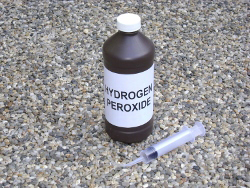
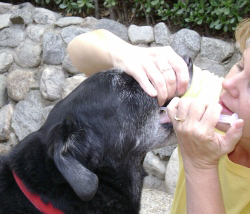
- To dilute caustic poisons, feed your pet large quantities of water or non-fat yogurt (most adult dogs and cats are lactose intolerant, so cow’s milk will cause them to vomit or have the runs). Activated charcoal (or even burned toast) may be recommended to absorb the poison.
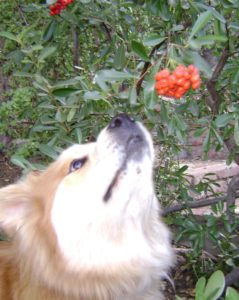 COMMON HOUSEHOLD POISONS INCLUDE:
COMMON HOUSEHOLD POISONS INCLUDE:
- Alcoholic Beverages
- Antifreeze (Ethylene glycol – Propylene glycol is a better alternative)
- Batteries
- Detergents, Fabric Softeners and Cleaners of all kinds
- Fertilizers and Insecticides, especially snail/slug bait pellets and rat poisons
- Foods – Chocolate, Coffee, Tea, Grapes & Raisins, Macadamia Nuts, Onions, Bread Dough, Peach and other fruit
- seeds/pits, Gravies and high-fat foods
- Medications (remember, some have candy coatings making them appealing to pets)
- Plants
- Trash
Visit ASPCA.org or HumaneSociety.org for a more complete list of things that can harm your pet!
OTHER WAYS YOUR PET CAN BE POISONED:
In addition to what goes in their mouths, dogs and cats can be poisoned by toxins that are absorbed, inhaled or injected into their bodies. Therefore knowing what, where (which body part) and how much Fido or Fifi got into determines your course of action.
Absorbed Poisons are substances that get on our pet’s paws and coat and are absorbed through their skin. These poisons may also be ingested once the animal licks and grooms himself. Wash the area with large quantities of water and visit your veterinarian to prevent long-term effects and discomfort. For oil-based toxins (petroleum products) use a gentle dishwashing liquid or shampoo before flushing with water. For powdery poisons, dust or vacuum away as water could activate the toxins. If the irritant is in your pet’s eye, carefully flush the eye with water or sterile saline solution.
Inhaled Poisons include aerosol sprays, carbon monoxide, gases, and other fumes inhaled by your pet. Quickly get the animal into fresh air and administer Rescue Breathing if needed by holding his mouth shut and breathing into his nostrils – every other second for animals 40 lbs and more while twice as quickly for smaller animals.
Injected Poisons don’t just come in a needle. Venom injected through insect stingers and snake bites can poison your pet. Administer 1mg of anti-histamine per pound of pet’s body weight, apply cold pack to any swelling for short periods of time and get pet to the Veterinarian if he exhibits any signs of breathing difficulty or extreme swelling. [Please also blog regarding Stinging Creatures.]
ANIMAL POISON CONTROL CENTER (APCC)
As the premier animal poison control center in North America, the APCC is your best resource for any animal poison-related emergency, 24 hours a day, 365 days a year. If you think that your pet may have ingested a potentially poisonous substance,
make the call that can make all the difference: (888) 426-4435. A $55 consultation fee may be applied to your credit card.
Note: The articles on this page are copyrighted. Please do not reprint or use portions for any purpose without written permission from the author. Request permission for usage by sending an email explaining how you’d like to use the materials and what parts specifically. Thank you in advance!

